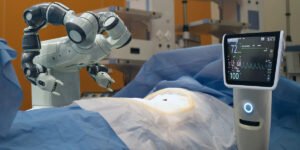Artificial intelligence (AI) is changing the way brain care is delivered, making it easier to diagnose problems, provide patients with more personalised care, and improve their overall health. Neurological diseases, such as epilepsy, stroke, and neurodegenerative diseases such as Alzheimer’s disease, are difficult to treat and require accurate and timely treatment. This article discusses the dramatic impact of artificial intelligence on neurological care. It shows how smart algorithms are transforming imaging methods, treatment planning, and neurology itself.
Understand How Complex Neurological Diseases are:
1. The Circumstances are Different and Complex
Neurological disorders are broad and can be difficult to treat in their own way. From sudden strokes to slowly progressive diseases like Parkinson’s disease, understanding the different types of neurological disorders is important for providing good care.
2. Diagnose the Problem
Neurological disorders can be difficult to diagnose. In combination with clinical evaluation, imaging studies, and laboratory tests, a multidisciplinary approach is often required to obtain an accurate and timely diagnosis.
3. Differences Between Each Person
Symptoms, progression, and response to treatment vary in people with neurological disorders. For neurological care to be optimally effective, treatments must be tailored to the unique needs of each patient.
What AI can do for Imaging and Diagnostics:
1. High-Resolution Image Analysis
In neurology, artificial intelligence makes imaging tests more accurate. Algorithms can look at complex brain images, such as MRIs and CT scans, and spot small problems, figuring out how the disease is progressing and providing doctors with useful information to make the right diagnosis.
2. Early Detection of Diseases that Damage Nerve Cells
With the help of artificial intelligence, neurodegenerative diseases such as Alzheimer’s disease can be detected earlier. Smart computers look at biomarkers, cognitive tests, and genetic information to find small signals that need to be addressed immediately for better control.
3. Computer Electroencephalogram (EEG) Analysis
Artificial intelligence makes it possible to automatically analyse EEG data, an important tool in identifying conditions such as epilepsy. Automated analysis can detect abnormal patterns more quickly and accurately, allowing doctors to develop more accurate treatment plans.
Personal Treatment Plan:
1. Applications of Pharmacogenomics in Neurology
Artificial intelligence makes pharmacogenomic research easier, allowing personalised treatment plans to be developed. By assessing a patient’s genetic makeup, algorithms can predict an individual’s response to medications, helping neurologists choose the most effective and well-tolerated treatments.
2. Get the Most from Deep Brain Stimulation (DBS)
Deep-brain stimulation (DBS) is used to treat conditions such as Parkinson’s disease. Artificial intelligence improves the programming of stimulus parameters. This personalised approach allows people with movement disorders to better control their symptoms and experience fewer side effects.
3. Rehabilitation Planning
Artificial intelligence is used in the planning of neurological rehabilitation programmes. Algorithms help create a rehabilitation plan tailored to the needs of each person and help them recover as best as possible by looking at data about them, such as their motor function and cognitive skills.
Applications of Artificial Intelligence in Real-World Neurological Care:
1. How to Predict and Prevent a Stroke
To identify strokes, AI algorithms look at risk factors, medical history, and imaging data. This proactive approach can reduce the risk of stroke by taking specific preventative measures, such as lifestyle changes or medications.
2. Predicting Seizures in Patients with Epilepsy
Artificial intelligence helps predict seizures in people with epilepsy. By looking at data from wearable technology and electroencephalograms, computers can calculate how likely a person is to have a seizure. This allows people to take steps to prevent attacks and better manage them overall.
3. Neurorehabilitation Apps
Mobile apps powered by artificial intelligence help with neurological rehabilitation. These apps personalise training, track progress, and provide immediate feedback so rehabilitation can take place outside the clinical space for ongoing personalised care.
Problems to be Solved and Ethical Issues to be Considered:
1. Data Security and Privacy
Using artificial intelligence in neurological care requires strong data privacy and security measures. Key issues to consider include ensuring the security of patients’ private data and complying with privacy laws.
2. How to Understand AI Algorithms
To build trust in neurological care, it is important to ensure that AI systems can be understood. To make informed choices based on AI-driven insights, doctors need to know how the algorithm reaches its conclusions.
3. Fair Access and Implementation
Equal access to AI-powered brain care is important. Differences in the way people use technology need to be addressed so that a broad group of patients can benefit from the benefits of artificial intelligence.
How Neurological Care will Change in the Future:
1. Neurology Clinic Using Artificial Intelligence
Neurological centres using artificial intelligence may be on the way in the future. To improve the quality of neurological care overall, these clinics can use artificial intelligence to help them make quick decisions, plan personalised treatments, and stay focused on their patients.
2. Advances in Brain-Computer Interface
When artificial intelligence is combined with brain-computer connectivity, it could be useful in neurological care. These interfaces could allow direct contact between the brain and external devices, which could lead to new ways to treat diseases involving communication problems.
3. Global Collaborative Research
Global collaborative research initiatives can help further advance the use of artificial intelligence in neurological care. Sharing data, ideas, and best practises can accelerate the process of creating and deploying new AI-powered technologies.
Conclusion:
When artificial intelligence is used in neurological care, it will revolutionise mindfulness technology, which will transform the field of neurology through precise, personalised, and proactive interventions. Neurologists, healthcare professionals, and researchers are at the forefront of an era of change that could transform the way we understand, diagnose, and treat neurological diseases. That’s because AI applications are getting better and better. There are still questions and ethical issues to consider, but the potential of artificial intelligence in neurological care gives us hope for better patient outcomes, easier access, and a more complete approach to the complex human brain.
FAQs:
1. How can artificial intelligence improve diagnosis in neurological care?
Artificial intelligence improves diagnosis by analysing complex imaging data such as MRI and CT scans, providing neurologists with accurate insights for accurate diagnosis. The technology enables early detection and tailor-made interventions.
2. Can you elaborate on the role of artificial intelligence in personalised treatment strategies for neurological diseases?
Artificial intelligence helps develop personalised treatment strategies by analysing genetic data and patients’ responses to medications. This allows neurologists to tailor interventions to optimise treatment effectiveness while minimising side effects.
3. How can artificial intelligence facilitate rehabilitation planning in neurological care?
Artificial intelligence supports rehabilitation planning by analysing patient data, including motor functions and cognitive skills. Algorithms help tailor neurorehabilitation plans to meet individual needs and support optimal recovery.
4. What are some practical applications of artificial intelligence in stroke prediction and prevention?
Artificial intelligence predicts strokes by analysing risk factors and medical history. This proactive approach can take targeted preventative measures to prevent strokes through lifestyle changes or appropriate medications.
5. What are the ethical considerations involved in using artificial intelligence in neurological care?
Ethical considerations include data privacy and security, the interpretability of AI algorithms, and resolving access discrepancies. Ensuring trust, understanding algorithmic decisions, and promoting fair access are important aspects of ethical AI implementation in neurology.



